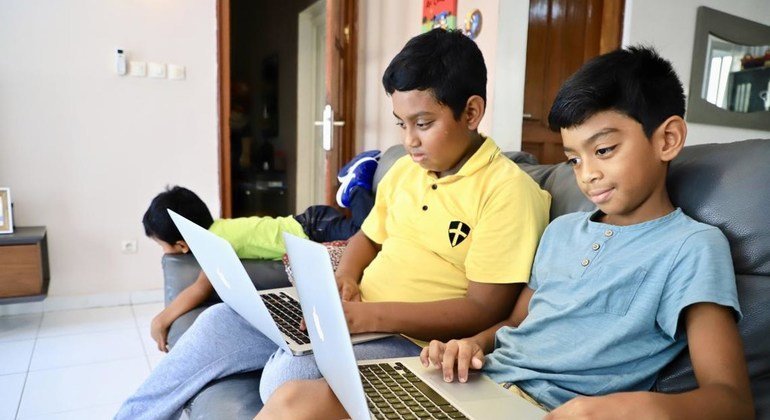With the Internet playing a vital role in navigating these complexities, the 18th Annual Internet Governance Forum organized by the Government of Japan, has the general theme “The Internet We Want – Empowering All People”.
Mitigate Risk
With rapid technological advancements, including in artificial intelligence (AI), likely to exacerbate existing inequalities, the Forum focuses on how we harness the benefits of digital technologies, while mitigating the risks .
While technology is evolving at lightning speed in a select group of countries, the reality is that 2.6 billion people are still offline, mostly in the Global South and in vulnerable communities.
According to the UN, digitalization is a phenomenon that concerns the whole of society and affects both connected and unconnected populations, but the distribution of its benefits remains very unequal.
Exploit digital technologies
In his opening message at the Forum, UN Secretary-General António Guterres highlighted the need to work together to close the gap in connectivity and digital governance, and to strengthen a human rights-centered and human-centered approach to digital cooperation.
“We must continue to exploit the digital technologies made possible by the Internet to help achieve the objectives set. Sustainable Development Goalsact for the climate and build a better world,” Mr. Guterres said in a video message on Sunday.
The Secretary-General also stressed the importance of United Nations Global Digital Compact which aims to define principles, objectives and actions to guarantee a human-centered digital future, which will be taken up at the Future Summit next year.
He said that “governments, the private sector and civil society must meet regularly to ensure that the commitments enshrined in the Compact are followed”.
The Internet We Want
The opening day of the Forum also saw the release of the vision document “The Internet We Want” written by the UN Secretary-General, appointed IGF Leadership Panel The president, Vint Cerf, recognized as one of the “fathers of the Internet”, and the vice-president, journalist Maria Ressa, winner of the 2021 Nobel Peace Prize.
The document reiterates that digital governance is essential for economic, social and environmental development, and is a crucial enabler of sustainable development.
He further explained what a global and open, universal and inclusive, fluid and trustworthy, safe and secure and rights-respecting Internet means.
“The Internet we want is: complete and open, universal and inclusive, fluid and trustworthy, safe and secure, and rights-respecting,” added the IGF leadership panel.
Meeting global challenges
Highlighting the critical role of the Internet in addressing global challenges and moving toward a better, more resilient future, UN Under-Secretary-General for Economic and Social Affairs Li Junhua warned: “But this requires responsive policies that leverage the benefits of digital technologies. while mitigating risks.
“The Forum must further strengthen its role as a global forum on digital policy, finding points of convergence and consensus and identifying digital solutions to achieve the set goals. 2030 Agenda,” he said.
Internet Governance Forum (IGF)
The Internet Governance Forum, convened by the Secretary-General of the United Nations and hosted this year by the Government of Japan, is the global multi-stakeholder forum for dialogue on Internet governance issues.
The IGF Annual Meeting brings together stakeholders from around the world to discuss the most pressing trends and challenges in Internet governance. IGF meetings facilitate the exchange of information and sharing of good policies and practices related to key elements of Internet governance in order to promote the sustainability, robustness, security, stability and development of the Internet.
Held October 8-12, this year’s FGI brings together more than 8,000 registered participants from more than 170 countries, making it the largest and most geographically diverse forum to date. Representatives from governments, the private sector, civil society, the technical community and international organizations participate.
The program includes more than 300 sessions, with eight subthemes: (1) AI and emerging technologies; (2) Avoid Internet fragmentation; (3) Cybersecurity, cybercrime and online safety; (4) Data governance and trust; (5) Digital divides and inclusion; (6) Global digital governance and cooperation; (7) Human rights and freedoms; and (8) Sustainability and environment.
The results of the IGF, particularly those from its high-level, parliamentary and youth components, will also serve as a concrete framework for the Global Digital Compact to be agreed at the UN. Future Summit next year.











